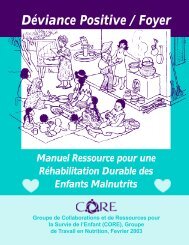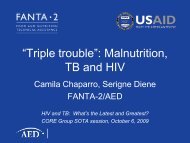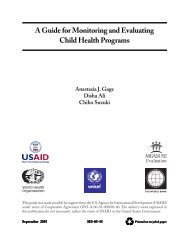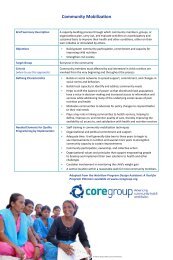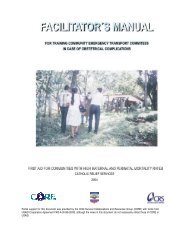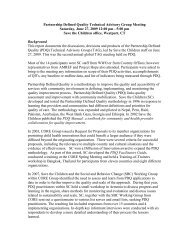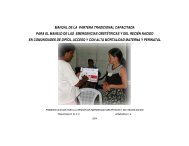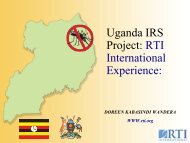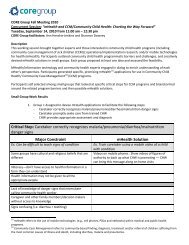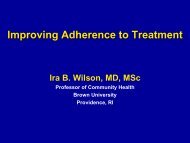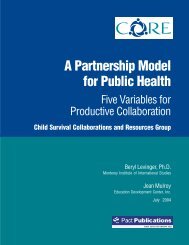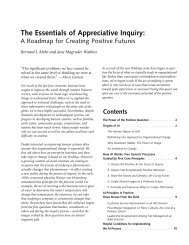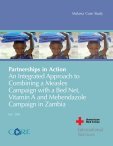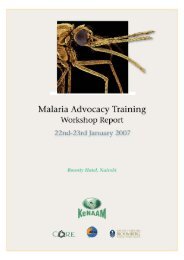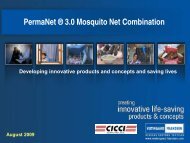Community Approaches to Child Health in Malawi: - CORE Group
Community Approaches to Child Health in Malawi: - CORE Group
Community Approaches to Child Health in Malawi: - CORE Group
You also want an ePaper? Increase the reach of your titles
YUMPU automatically turns print PDFs into web optimized ePapers that Google loves.
management and supervision of health services by community committees,<br />
and collaboration on community-based health <strong>in</strong>formation systems. 5<br />
Implementation of this element calls for changes <strong>in</strong> the roles of both<br />
health workers and community members. <strong>Health</strong> workers need <strong>to</strong> not<br />
only improve <strong>in</strong>terpersonal counsel<strong>in</strong>g with clients <strong>in</strong> health facilities and<br />
<strong>in</strong>crease community outreach and education of community members about<br />
danger signs requir<strong>in</strong>g care-seek<strong>in</strong>g, but also become more receptive <strong>to</strong><br />
<strong>in</strong>put from the community, and more accountable for the quality of the<br />
services they provide. Through tra<strong>in</strong><strong>in</strong>g <strong>in</strong> quality assurance techniques,<br />
health workers can come <strong>to</strong> see <strong>in</strong>put from the community as constructive<br />
and useful, rather than as negative and <strong>in</strong>terfer<strong>in</strong>g.<br />
In his evaluation of World Relief’s USAID-funded child survival project<br />
<strong>in</strong> Chokwe, Mozambique, Dr. Carl Taylor noted that there is “a symbiotic<br />
relationship between demand for services and motivation of health care<br />
workers.” 6 This symbiosis is a key element <strong>in</strong> successful C-IMCI programs.<br />
When community members value the services that health care workers<br />
provide, they are more likely <strong>to</strong> access those services, and, more importantly,<br />
approach the workers with an attitude of trust.<br />
Many health care workers respond <strong>to</strong> <strong>in</strong>creased community trust and<br />
appreciation with better and more compassionate service delivery. Elements<br />
2 and 3 of the C-IMCI framework, along with facility-based IMCI tra<strong>in</strong><strong>in</strong>g,<br />
are designed <strong>to</strong> enhance the development of partnerships. Once a work<strong>in</strong>g<br />
partnership is established, community members and their leaders, as well<br />
as MOH staff and leaders, are better able <strong>to</strong> resolve emerg<strong>in</strong>g problems <strong>to</strong><br />
preserve what both groups have come <strong>to</strong> value. Additionally, when a good<br />
moni<strong>to</strong>r<strong>in</strong>g and reward system is <strong>in</strong> place with<strong>in</strong> the MOH, the cl<strong>in</strong>ic staff<br />
who work <strong>in</strong> effective partnership with the surround<strong>in</strong>g communities are<br />
more likely <strong>to</strong> be rewarded and recognized for their health outcomes.<br />
World Relief’s USAID-funded child survival projects <strong>in</strong> <strong>Malawi</strong> have<br />
employed several methodologies <strong>to</strong> implement this first C-IMCI element,<br />
presented below.<br />
<strong>Community</strong> Outreach Sessions<br />
World Relief tra<strong>in</strong>ed Care <strong>Group</strong> volunteers <strong>to</strong> help the MOH conduct<br />
community outreach sessions for growth moni<strong>to</strong>r<strong>in</strong>g, immunization, and<br />
other services. These volunteers reached each household <strong>to</strong> assure that<br />
MOH-led community outreach sessions were well attended and addressed<br />
any false expectations concern<strong>in</strong>g the services that were available. World<br />
Relief also assisted with the transport of MOH personnel and supplies for<br />
5 W<strong>in</strong>ch P. et al.<br />
6 Taylor, Carl. F<strong>in</strong>al Evaluation of Vurhonga 2, World Relief Mozambique’s USAID-funded <strong>Child</strong> Survival Program,<br />
2003.<br />
11 <strong>Community</strong> <strong>Approaches</strong> <strong>to</strong> <strong>Child</strong> <strong>Health</strong> <strong>in</strong> <strong>Malawi</strong>



